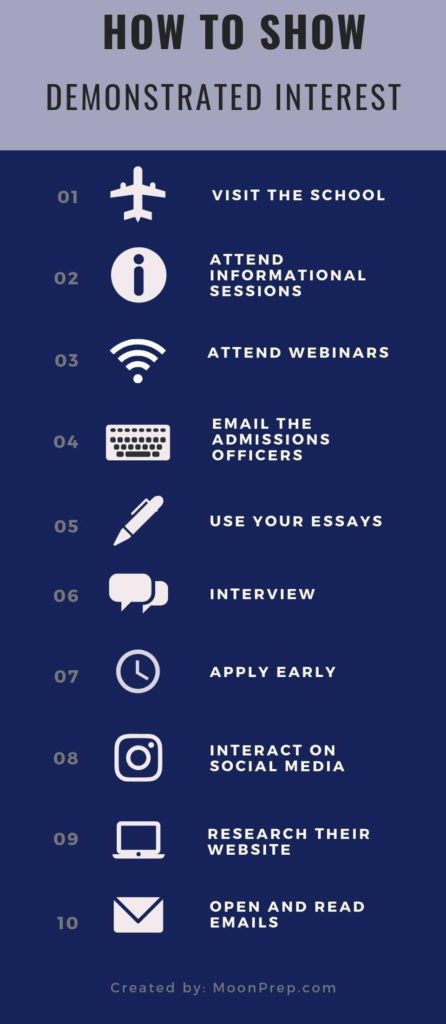Demonstrate interest!
September 28th, 2021Demonstrated interest is a concept thrown around in the college admissions world that can be difficult to embrace. Believe it or not, your level of enthusiasm for and engagement with a school may matter, and will be tracked by SOME colleges or universities (not all). I used to view it cynically, akin to Orwell’s Big Brother in 1984, but now see that benefits accrue not only to colleges but to students, as well.

Many colleges work hard to determine the level of interest a student has for their school. This helps colleges predict their yield (% of accepted students who will enroll), which is important for them to protect.
Pre-COVID, there was no better way to demonstrate interest than visiting campus. The pandemic has certainly changed the way some colleges approach face to face contact, making it easier to connect virtually through online tours and information sessions.
Ethan Sawyer, The College Essay Guy, has published a fantastic list of ways to demonstrate interest to your top choice schools. When reading his article below, keep in mind that as you engage you’re also developing a better sense of optimal fit and, ultimately, optimal enrollment choice, goals that we at Shrop Ed hold for all students. The article referenced below is from a site we view as a phenomenal resource for college applicants.
This practical How-To Guide was written by Ethan Sawyer, published on The College Essay Website
What is Demonstrated Interest? A Practical How-To Guide
This blog post was inspired by podcast Episode 108 with Monica James, in which we discuss everything from how to find out which colleges track demonstrated interest to whether you should or shouldn’t like a college’s Facebook page. You can find that episode here.
Spoiler alert: In this blog post I’ll share with you a list of potential Action Items that involve (among other things) attending college fairs, speaking with admission reps, and maybe even opening a few of those emails that colleges send you—things that might stress you out. And why, you might wonder, would the “ease, purpose and joy” guy ask you to do things that mostly bring you anxiety?
Why are we talking about demonstrated interest in the first place?
Demonstrated interest (which I’ll explain in a moment) has become an important factor that some (keyword: some!) colleges consider when deciding whether to admit students or not. In fact, take a look at this NACAC survey from 2019 asking colleges which factors most influenced admission decisions:
Read more at College Essay Guy>>
Tagged: Demonstrated interest
Make demonstrated interest work in your favor with these 10 steps
October 1st, 2019Can demonstrating interest in a college of your choice impact your chances of getting in? In many cases, it can! Demonstrated interest is the degree to which an applicant shows genuine interest in enrollment. Of course, it’s important to show your seriousness throughout the application process, and nothing’s weighted more heavily than your academic record and extracurricular accomplishments.
Private colleges are more likely than public universities to use demonstrated interest as a significant factor. Schools with very high yield rates, such as Stanford, MIT and most in the Ivy League, don’t concern themselves with this when determining final decisions, either.
Now the question is, how can you show that you’re interested in your top choice schools without “spamming” admissions counselors just for the sake of being in touch? The article referenced below from Forbes.com lays out 10 easy ways to stay in contact with colleges while remaining genuine.
A note to our boarding school families: Boarding schools, like colleges, strive to understand the family’s level of interest when considering admission decisions. Many of the same recommendations apply, and we think you’ll find this article interesting, too.
Article linked below from Forbes, published on September 17, 2019, written by Kristen Moon
10 Ways Students Can Use Demonstrated Interest To Their Benefit

What Is Demonstrated Interest?
Demonstrated interest (DI) is something universities measure to determine the level of interest a student has in a particular school. For some institutions, DI is something that they consider because it shows how eager students are to attend. With the rise of the Common Application and the Coalition Application, it is easy for students to quickly add on schools to their list without putting much thought or effort into it. Therefore, to see who is genuinely interested in the program is useful for the universities to see who they might want to admit.
Contact with the institution can be a useful tactic for students, especially ones who may be borderline for admission. Having an in-person interaction can help display your positive interactions and characteristics, bringing your application alive off the page.
Tagged: Applications, Campus visits, College, Demonstrated interest
Demonstrated interest: what’s it all about?
September 4th, 2018Have you ever had to choose someone to help you with a project or become a member of your team, and found yourself leaning towards the person who shows more interest and dedication to the task?
Many colleges act the same way.
Assessing a student’s “demonstrated interest” has become one of the best ways to gauge an applicant’s likelihood of enrolling if admitted. We’ve discussed the importance of demonstrated interest in the past and we continue to encourage students to develop connections with admission counselors at colleges they’re considering seriously.
Demonstrated interest comes in many forms and is not restricted to campus visits. Web chats, information requests, even sending official test score reports can signal your interest to a college.
Many schools are looking for students to initiate contact with their admissions office. Seniors can demonstrate interest in the coming weeks by meeting with visiting college admission representatives in their schools and at locally-held gatherings, or emailing the admissions office to find out if and when they will be in the area. Juniors can do the same.
It’s important to note that not all colleges use demonstrated interest as a factor in admission decisions. Colleges offering admission to only a single-digit proportion of applicants, for example, do not generally encourage such contact. However, if a school strongly encourages campus visits or offers campus interviews, your level of interest will probably be taken into consideration. As always, it is important to be genuine in your communication with admission staff and be yourself.
Here’s a great article to tell you more.
Article referenced below published on May 21, 2018 by US News, written by Kelly Mae Ross
In addition to reviewing transcripts, essays and test scores, some college admissions officers look at whether prospective students have shown enthusiasm and curiosity about a school during the application process.
In the admissions world, this is what’s known as demonstrated interest.
In a 2017 report from the National Association for College Admission Counseling, 13.7 percent of colleges surveyed rated demonstrated interest as having considerable importance in freshman admissions decisions. Another 25.5 percent said it was of moderate importance.
Read more at US News >>
Tagged: Admission decision, College, Demonstrated interest
More on demonstrated interest
October 30th, 2017You may have heard the term “demonstrated interest” in reference to college admissions – we’ve probably discussed it – but are you still wondering what it means and how important it is during the admissions process?
You’re demonstrating interest when you show a school that you’re willing to engage and there’s a true possibility you’ll choose to enroll. It can come in the form of campus visits, interviews, attending college meetings at school, communication with admissions counselors, and interaction on colleges’ social media sites. Your demonstrated interest can be of great value to an admissions office when comparing two similar candidates.
Not all colleges consider demonstrated interest, though. Schools with minuscule acceptance rates and sky-high yield rates (Ivies, MIT, Stanford, etc.) don’t need to pay attention to this as they know just about everyone wants to enroll. Most public universities do not use demonstrated interest as a way to evaluate students, either. However, the vast majority of private colleges do pay attention to students’ engagement with them.
The article linked below from Inside Higher Ed raises an important social/economic equity issue tied to demonstrated interest. While we want our students to demonstrate interest in each college on their list to the best of their ability, our hope is that more colleges will help subsidize campus visits for students with limited means to make the trip. Face to face interaction with college representatives is highly effective, but if travel isn’t feasible, other means of engagement can also go a long way toward serious demonstration of interest.
Article referenced below from Inside Higher Ed
“Demonstrated interest” is one of the admissions criteria used by many competitive colleges — even though it may not have anything to do with an applicant’s intelligence or character. The term refers to ways that an applicant shows he or she is serious about enrolling at a given college. An applicant who calls with questions about a particular program is more valued than one who doesn’t communicate beyond applying. An applicant who visits shows more demonstrated interest than one who doesn’t, and so forth. Many colleges factor in demonstrated interest to admissions and aid decisions, wanting to admit applicants who will enroll. The idea is to have better planning and to improve the yield, the percentage of admitted applicants who enroll.
A new research paper suggests that demonstrated interest has become another way wealthy students have an extra edge — and recommends that colleges consider policy changes as a result.
Read more at Inside Higher Ed >>Tagged: Campus visits, College, Demonstrated interest, Interviews




